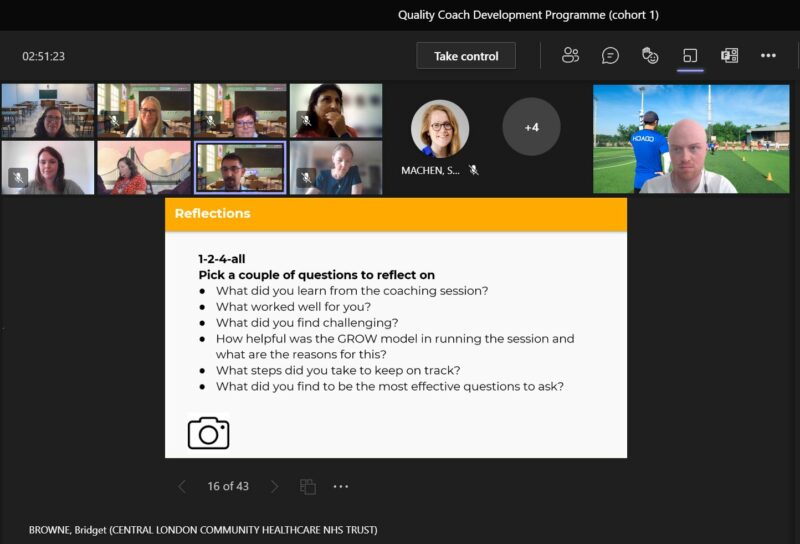After more than a year of planning and co-design, the Q Exchange project team commenced the first pilot of the Quality Coach Development Programme in July 2021. This marks a key milestone in our project, and will be the first of several pilots of the programme content, before the content is made freely available to all Q members.
A quick re-cap of the programme
In my previous blog I discussed the challenge we face in building QI capability and capacity at all levels of the health and care system. One method to meet the growing demand for improvement support is to train a small proportion of front line staff in more advanced improvement concepts within each organisation or system. This approach was outlined in the NHS report Building capacity and capability for improvement: embedding quality improvement skills in NHS providers.
We have worked with the Q community to co-design and create the programme content and teaching materials
The aim of the Q Exchange project was to address this challenge through the creation of a ‘Quality Coach’ development programme. In our definition, a ‘Quality Coach’ is a frontline worker (clinical or non-clinical) skilled in QI methodology and coaching techniques, with protected time to support colleagues running QI projects. The Q Exchange project focused on the co-design and production of teaching materials and programme content, resulting in an open-access full training programme to develop Quality Coaches within each organisation. We have pledged to make all materials freely available to all Q members.
The co-design process
We have worked with the Q community to co-design and create the programme content and teaching materials. The design group was composed of more than 20 members from 12 different healthcare providers representing acute, community, primary care and social care, as well as universities, third sector organisations and the private sector. Over the past year we have worked together to understand and scope the challenge we face in building coaching capability and to create a curriculum and content to address this. Through our collective experience in leading, supporting and embedding QI in our respective organisations, we have identified the core concepts that we feel a Quality Coach would need to learn in order to provide the optimal support to their peers.
The co-design has been a fantastic experience and the end result of our work goes far beyond our initial expectations. Through a truly collective and collaborative effort, we have created an excellent training resource that we hope will be of real benefit to many organisations in the health and care sector.
Traditional approaches, such as meeting in person, would have hindered or slowed down the co-design process
Of course despite the positive, there were also obstacles to the co-design process. The COVID-19 pandemic brought many significant challenges to the design group. The project has been hindered by delays in task completion and lack of availability, due to disruptions in normal working life owing to staff redeployment or otherwise. Unfortunately some members of the initial project team decided they were no longer able to continue supporting the project, and for those who remained involved in the project, we saw reduced availability, reduced time to work on materials and/or tasks and burnout. Fortunately we were able to recruit additional members to the project team, and we adjusted our expectations on the timeline of the project.
There were some unanticipated opportunities for better collaboration as a result of the response to COVID-19. We were able to work together virtually to co-design the programme and the materials and worked asynchronously using online collaboration tools to provide feedback, discuss progress and plan next steps. This ultimately enabled more people from a large geography to collaborate together. Traditional approaches, such as meeting in person, would have hindered or slowed down the co-design process, given some would not have been able to travel hundreds of kilometres for a face-to-face meeting. We all agreed that it is sensible to continue working in this manner, even after the end of the current pandemic.

Next steps
We are currently piloting the programme content in Central London Community Healthcare NHS Trust. Those most closely involved in the co-design of the content, including myself, are running this first pilot to identify and address any obvious gaps or drawbacks with the materials. We have subsequent pilots scheduled in Lincolnshire, East London and Yorkshire. Our level of involvement will vary within each pilot, ranging from high, moderate to little-to-none. The purpose of these pilots is to test the materials to facilitate any adjustments and amendments to content and structure. Importantly, they will also help us determine how simple the content is to deliver with no prior involvement in the project.
Get involved with the next stage
We need more help with this. We want to ensure that the materials are tested in a variety of settings, particularly with those who have not yet had any involvement in the design of the programme and its content. If your organisation is interested then contact me through twitter or email: sidney.beech@nhs.net